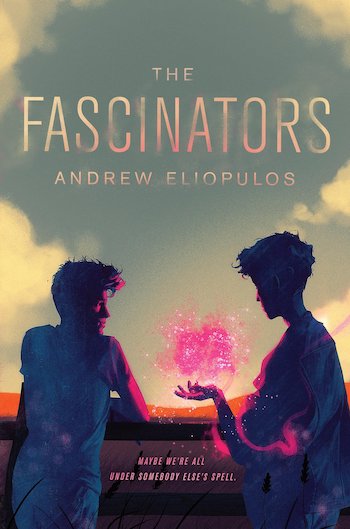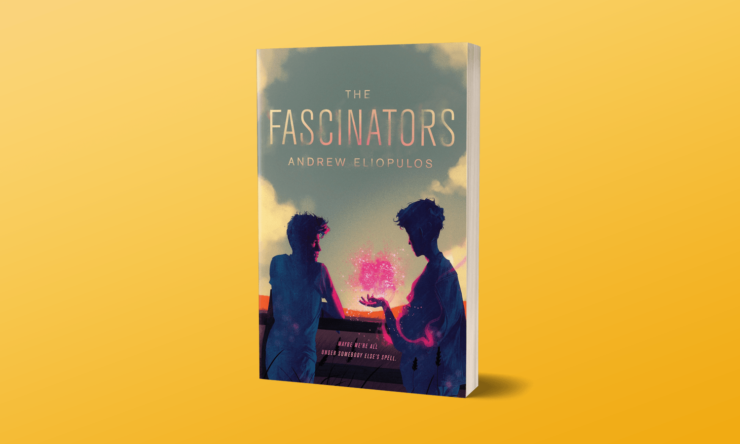Sam has magic, a plan for the future, and an enormous crush on his best friend. It’s his senior year of high school and he’s ready to go out with a bang—win the Georgia State Magic Convention with his friends, win the boy, and show everyone in his podunk little town that being gay and magic is nothing to be ashamed of. In fact, it’s pretty great. Between his club—the Fascinators—his embarrassing but loving parents, and the support of his community in the big city next door, Sam is happy with who he is and where he’s headed. When two thirds of his trio start to drift away, though, and when a dangerous cult moves in down the road, Sam has to confront: can he really be happy if he’s always defining himself against other people?
Andrew Eliopulos’ debut novel, The Fascinators, is a queer southern teen novel in the realest possible way (minus the magic, that is). Set in an “I-saw-Goody-Proctor-with-the-devil” town in Georgia, the novel deals with small-town love, big city aspirations, homophobia, and general religious angst. But more than anything it embodies that transitional senior year feeling of “things are falling apart but maybe they were never that together to begin with.”
The story itself follows Sam as he tries, hope against hope, to find a way to talk to his friend James about his feelings. The problem is that James has been acting strange lately—partying, getting into fights, hiding things—and Sam feels further away than ever. At one of these parties, James does something irreversible: in a moment of panic, he steals a book from a strange group of magic-users. Of course Sam and the third of their trio, Delia, try to help clean up the mess—they’re the Fascinators after all, and they stick together. But finding the book turns out to be like jumping out of the frying pan and into the fire. This strange group of magic-users is up to something dark, and not all of the Fascinators agree on how to deal with them. Add to this two new members of the Fascinators club—one handsome, dimpled new boy, and one frustratingly nice church-goer—and the trio is more out-of-balance than ever. When was Sam supposed to confess his feelings to James, again?
True to life, Sam’s story is defined by his friends, and the novel is accordingly shaped by the intricacies of their relationships. James and Delia are lovingly detailed by our narrator, are complex and dark, and are easily the most compelling characters in the novel. James, especially, breaks my heart. As both best friend and love object, he is very much the lynchpin of the story; but more than that he is the archetype of so many closeted queer men I’ve known in the south, down to his conflicted relationship with his faith. His relationship with Sam is a tragic one that explores how trauma can make someone—even someone you love—unknowable and inaccessible.
Buy the Book


The Fascinators
And Delia, sweet Delia, breaks right out of the “brainy girl of the trio” trope by leaning into bitterness and ambition. I may have started the novel frustrated at her relegation to the sidelines, but it turns out she was just as frustrated at playing the perpetual third wheel. Unlike James, Delia’s reasons and heart are transparent, even when her actions are not. Yet her love of Sam at the start of the novel comes in the form of real understanding and compassion. I bought their relationship, hook, line, and sinker.
Despite—or perhaps because of—these two characters, I found the ending of The Fascinators incredibly unsatisfying. Don’t get me wrong—I love an ambiguous ending, but this was just abrupt. It feels, on some level, that Eliopulos is leveling for a sequel. But by providing resolution where it felt unearned, and ambiguity regarding the most complex and interesting characters, the whole thing just fell flat.
The dissatisfaction I had with the ending of the novel made problems out of elements I had initially quite liked. Sam’s character arc, for instance, is about learning how to be his own person, apart from his friends—and so it made sense, initially, that most of his actions were just reactions to what was happening around him. But if his great act of personal agency ends up falling kind of flat, what did all of his lack of depth really lead to? And for all that I loved the novel’s exploration of Christianity in the deep south, if it didn’t explicitly tie into the evil cult storyline or change any of the story’s outcomes, was it really saying anything at all?
Finally—the fact that I wrote this entire review without talking about Sam’s other love interest is its own problem. Denver ended up having so little to do with the plot, I just didn’t care about their relationship by the end—and boy does it pain me to say that about a canon queer relationship. On the flip side, Eliopulos writes the tragic “gay kid yearning for his closeted/straight best friend” dynamic very well. I’m sympathetic with the desire not to present the Sam-James relationship as a healthy or viable endgame, but Denver’s dimples and charm just couldn’t make up for a lack of plot/theme relevance or even basic chemistry.
Despite all this, there really were good elements of The Fascinators—not just Delia and James, who I’ve already gushed about—but also a real and lived-in portrayal of a Southern small town, a loving gesture towards queer community, and a spooky magic cult (which I never don’t love). But it’s the complexity, ambiguity, and heart in Delia and James’ stories that would make me pick up another of Eliopulos’ novels, including perhaps a Fascinators sequel. Something really stunning shines through in the way Eliopulos writes about friendship.
The Fascinators is available from Quill Tree Books.
Em Nordling reads, writes, and manages research in Louisville, KY.










